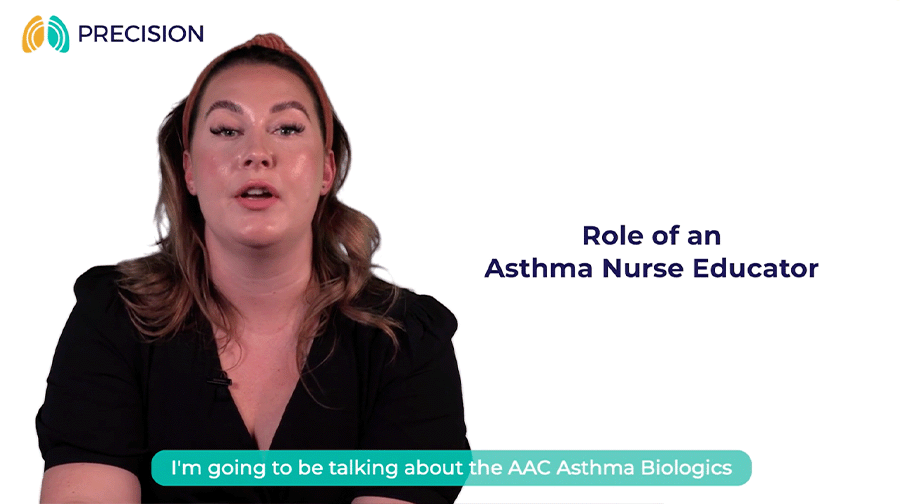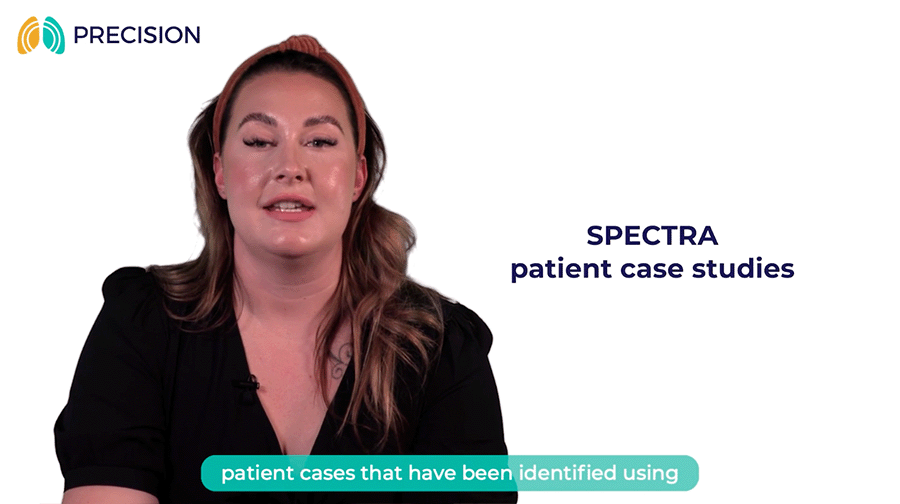SPECTRA helps you identify & refer your patients
Patients with uncontrolled Asthma may be slipping through the net



SPECTRA helps you identify & refer your patients
Patients with uncontrolled Asthma may be slipping through the net



SPECTRA Donated Service Programme is funded by AstraZeneca & developed in collaboration with NHS England (NHSE) hosted Accelerated Access Collaborative (AAC)

Recommended by the Health Innovation Network: Better outcomes for asthma patients and the planet
SPECTRA Donated Service Programme is funded by AstraZeneca & developed in collaboration with NHS England (NHSE) hosted Accelerated Access Collaborative (AAC)

Recommended by the Health Innovation Network: Better outcomes for asthma patients and the planet
SPECTRA AT A GLANCE
Integrated clinical system resources that involve no external software or processing of patient identifiable data.
Compatible with EMIS Web, SystmOne and Vision.

Find your patients through
pre-created searches
SPECTRA Search Rationale

Triggered when accessing electronic records
SPECTRA Alert Rationale

Auto-populated uncontrolled asthma referral form
SPECTRA Example Form
SPECTRA AT A GLANCE
Integrated clinical system resources that involve no external software or processing of patient identifiable data.
Compatible with EMIS Web, SystmOne and Vision.

Find your patients through
pre-created searches
SPECTRA Search Rationale

Triggered when accessing electronic records
SPECTRA Alert Rationale

Auto-populated uncontrolled asthma referral form
SPECTRA Example Form
The Benefits of SPECTRA Reporting
Dashboards enable you to compare and measure the impact of SPECTRA across your local healthcare economy.
The data-driven insights help healthcare professionals to make informed and targeted interventions along with understanding the resource allocation required.
Click here to view an example of a Follow-up Practice Level Report
ICB Level Reporting
Dashboards across ICB level enable benchmarking against local standards within participating PCNs, to share best practice.

PRAISED BY SEVERE ASTHMA SPECIALISTS
Using SPECTRA in over 30 practices has helped Staffordshire identify 120 new severe asthma patients in 12 months.

SPECTRA CASE STUDIES

NEW SPECTRA AT SCALE & ACTION LEARNING PROGRAMME
The SPECTRA At Scale & Action Learning Programme is available for ICBs, UHBs, LCGs & HSCPs that wish to deploy SPECTRA across practices within their local healthcare economy, enabling a population health approach to uncontrolled asthma.
The Action Learning element of the programme aims to improve the quality of care for patients with uncontrolled asthma by equipping healthcare professionals with the knowledge and skills to utilise all of the SPECTRA resources and address quality improvement challenges.
CONSIDER REACHING OUT TO A RESPIRATORY SPECIALIST
Choose a respiratory specialist from the Expert on Demand programme who will guide you in identifying and managing your uncontrolled asthma patients.
Over 300 Healthcare Professionals have attended an Expert on Demand meeting in 2022.

- Over 20 experts are available to choose from
- Select the date and time that suits you
- 30-minute live presentation with Q&A
- Content is non-promotional and CPD certified
- Expert on Demand is fully funded by AstraZeneca
Expert on Demand is fully funded by AstraZeneca
PRIMARY CARE PLAYS AN ESSENTIAL ROLE IN A COMPLEX CONDITION
Some facts you may not know about severe asthma:
- Severe asthma is a debilitating chronic disease for patients and is associated with a high economic burden.1-5
- Difficult to manage with optimised inhaled therapy.1-5
- 72% of patients with suspected severe asthma in primary care have not been reviewed by a specialist in the past year.6
- Almost 4 in 5 patients who would benefit from a biologic treatment in the UK are currently not accessing treatment.7
WHAT HEALTHCARE PROFESSIONALS SAY ABOUT SPECTRA
"Benchmarking all the practices in the PCN has enabled more focused respiratory reviews and allowed the PCN to plan more clinics in areas of health inequality and improve access to specialist treatment."
Nipa Patel
Lead PCN Pharmacist - Sasse Network 2
"SPECTRA is now getting the recognition it deserves as a tool that has simplified a structured approach to identifying and referring people living with uncontrolled and severe asthma, and it has been disseminated across primary, secondary, and tertiary care."
Beverley Bostock
Lead Asthma Lead - Association of Respiratory Nurses
"I found the SPECTRA searches and alerts very easy to upload and run in our GP clinical systems and the resources have been invaluable in identifying potential severe asthma patients for my advanced respiratory clinics."
Nipa Patel
Lead PCN Pharmacist - Sasse Network 2
"Referring patients with suspected severe asthma using the SPECTRA template ensured all the relevant information was included, thus reducing the delay in patients receiving specialist care."
Nipa Patel
Lead PCN Pharmacist - Sasse Network 2
WHAT HEALTHCARE PROFESSIONALS SAY ABOUT SPECTRA
“I found the SPECTRA searches and alerts very easy to upload and run in our GP clinical systems and the resources have been invaluable in identifying potential severe asthma patients for my advanced respiratory clinics.
“Referring patients with suspected severe asthma using the SPECTRA template ensured all the relevant information was included, thus reducing the delay in patients receiving specialist care.
“Benchmarking all the practices in the PCN has enabled more focused respiratory reviews and allowed the PCN to plan more clinics in areas of health inequality and improve access to specialist treatment.”
Nipa Patel | Lead PCN Pharmacist
Sasse Network 2
“SPECTRA is now getting the recognition it deserves as a tool that has simplified a structured approach to identifying and referring people living with uncontrolled and severe asthma, and it has been disseminated across primary, secondary, and tertiary care.”
Beverley Bostock | Lead Asthma Lead
Association of Respiratory Nurses
SPECTRA has been developed on behalf of AstraZeneca by Oberoi Consulting.
Registrations, technical support and training is managed by Oberoi Consulting as the SPECTRA Support Team.
Oberoi Consulting has been working across healthcare and the NHS for more than 20 years.

1. Jackson DJ, et al. Thorax 2021;76:220–227 2. Kerkhof M, et al. Thorax 2018;73:116–124 3. Price DB, et al. J Asthma Allergy 2018;11:193–204 4. Nunes C, et al. Asthma Res Pract 2017;3:1 5. Global Initiative for Asthma (GINA). Global strategy for asthma management and prevention. 2022. Available from: https://ginasthma.org/wp-content/uploads/2022/05/GINA-Main-Report-2022-FINAL-22-05-03-WMS.pdf [Last Accessed: March 2024] 6. Ryan D, Heatley H, Heaney LG, et al. Potential Severe Asthma Hidden in UK Primary Care. Journal of Allergy and Clinical Immunology: In Practice 2021;9:1612-1623.e9 7. Asthma UK. Living in limbo: the scale of unmet need in difficult and severe asthma. 2019. Available from: https://www.asthma.org.uk/69841483/globalassets/get-involved/external-affairs-campaigns/publications/living-in-limbo/living-in-limbo—the-scale-of-unmet-need-in-difficult-and-severe-asthma.pdf [Last Accessed: March 2024]

 Access SPECTRA
Access SPECTRA